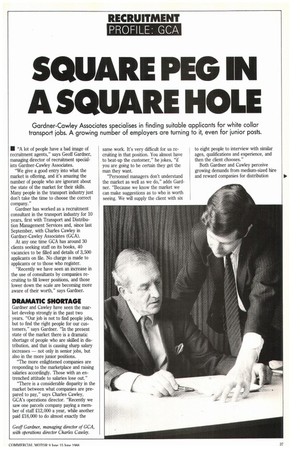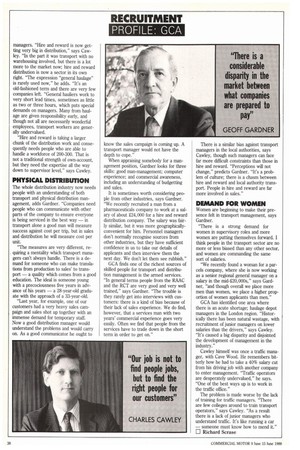SQUARE PEG IN A SQUARE HOLE
Page 41

Page 42

If you've noticed an error in this article please click here to report it so we can fix it.
Gardner-Cawley Associates specialises in finding suitable applicants for white collar transport jobs. A growing number of employers are turning to it, even for junior posts.
• "A lot of people have a bad image of recruitment agents," says Geoff Gardner, managing director of recruitment specialists Gardner-Cawley Associates.
"We give a good entry into what the market is offering, and it's amazing the number of people who are ignorant about the state of the market for their skills. Many people in the transport industry just don't take the time to choose the correct company."
Gardner has worked as a recruitment consultant in the transport industry for 10 years, first with Transport and Distribution Management Services and, since last September, with Charles Cawley in Gardner-Cawley Associates (GCA).
At any one time GCA has around 30 clients seeking staff on its books, 40 vacancies to be filled and details of 3,500 applicants on file. No charge is made to applicants or to those who register.
"Recently we have seen an increase in the use of consultants by companies recruiting to fill lower positions, and those lower down the scale are becoming more aware of their worth," says Gardner.
DRAMATIC SHORTAGE
Gardner and Cawley have seen the market develop strongly in the past two years. "Our job is not to find people jobs, but to find the right people for our customers," says Gardner. "In the present state of the market there is a dramatic shortage of people who are skilled in distribution, and that is causing sharp salary increases — not only in senior jobs, but also in the more junior positions.
"The more enlightened companies are responding to the marketplace and raising salaries accordingly. Those with an entrenched attitude to salaries lose out."
"There is a considerable disparity in the market between what companies are prepared to pay," says Charles Cawley, GCA's operations director. "Recently we saw one parcels company paying a member of staff £12,000 a year, while another paid £18,000 to do almost exactly the same work. It's very difficult for us recruiting in that position. You almost have to beat-up the customer," he jokes, "if you are going to be certain they get the man they want.
"Personnel managers don't understand the market as well as we do," adds Gardner. "Because we know the market we can make suggestions as to who is worth seeing. We will supply the client with six to eight people to interview with similar ages, qualifications and experience, and then the client chooses."
Both Gardner and Cawley perceive growing demands from medium-sized hire and reward companies for distribution managers. "Hire and reward is now getting very big in distribution," says Cawley. "In the part it was transport with no warehousing involved, but there is a lot more to the market now; hire and reward distribution is now a sector in its own right. "The expression "general haulage" is rarely used now," he adds. "It's an old-fashioned term and there are very few companies left. "General hauliers work to very short lead times, sometimes as little as two or three hours, which puts special demands on managers. Many from haulage are given responsibility early, and though not all are necessarily wonderful employees, transport workers are generally undervalued.
"Hire and reward is taking a larger chunk of the distribution work and consequently needs people who are able to handle a workforce of 200-300. That is not a traditional strength of own-account, but they need the expertise all the way down to supervisor level," says Cawley.
PHYSICAL DISTRIBUTION
The whole distribution industry now needs people with an understanding of both transport and physical distribution management, adds Gardner. "Companies need people who can communicate with other parts of the company to ensure everyone is being serviced in the best way — in transport alone a good man will measure success against cost per trip, but in sales and distribution he will measure cost per unit.
"The measures are very different, re. quiring a mentality which transport managers can't always handle. There is a demand for someone who can make translations from production to sales' to transport — a quality which comes from a good education. The ideal is someone young with a precociousness five years in advance of his years — a 28-year-old graduate with the approach of a 33-year-old.
"Last year, for example, one of our customers had a very heavy sales campaign and sales shot up together with an immense demand for temporary staff. Now a good distribution manager would understand the problems and would carry on. As a good communicator he ought to know the sales campaign is coming up. A transport manager would not have the depth to cope."
When appraising somebody for a management position, Gardner looks for three skills: good man-management; computer experience; and commercial awareness, including an understanding of budgetting and sales.
It is sometimes worth considering people from other industries, says Gardner. "We recently recruited a man from a pharmaceuticals company to work at a salary of about £24,000 for a hire and reward distribution company. The salary was fairly similar, but it was more geographicallyconvenient for him. Personnel managers don't normally recognise sources from other industries, but they have sufficient confidence in us to take our details of applicants and then interview them the next day. We don't let them see rubbish."
GCA finds one of the richest sources of skilled people for transport and distribution management is the armed services. "In general terms people from the RAAC and the RCT are very good and very well trained," says Gardner. "The trouble is they rarely get into interviews with customers; there is a kind of bias because of their lack of sales experience. We do find, however, that a services man with two years' commercial experience goes very easily. Often we find that people from the services have to trade down in the short term in order to get on." There is a similar bias against transport managers in the local authorities, says Cawley, though such managers can face far more difficult constraints than those in hire and reward. "Perceptions will not change," predicts Gardner. "It's a problem of culture; there is a chasm between hire and reward and local authority transport. People in hire and reward are far more involved in sales."
DEMAND FOR WOMEN
Women are beginning to make their presence felt in transport management, says Gardner.
"There is a strong demand for women in supervisory roles and more women are putting themselves forward. I think people in the transport sector are no more or less biased than any other sector, and women are commanding the same sort of salaries.
"We recently found a woman for a parcels company, where she is now working as a senior regional general manager on a salary in the mid-g20, 000s," says Gardner, "and though overall we place more men than women, we place a higher proportion of women applicants than men."
GCA has identified one area where there is an acute shortage; haulage depot managers in the London region. "Historically there has been natural wastage, with recruitment of junior managers on lower salaries than the drivers," says Cawley. "It's caused a big disparity and disjointed the development of management in the industry."
Cawley himself was once a traffic manager, with Cave Wood. He remembers bitterly how he had to take a 40% salary cut from his driving job with another company to enter management. "Traffic operators are desperately undervalued," he says. "One of the best ways up is to work in the traffic office."
The problem is made worse by the lack of training for traffic managers. "There are few colleges around to train transport operators," says Cawley. "As a result there is a lack of junior managers who understand traffic. It's like running a car — someone must know how to mend it." D Richard Scrase
















































































































